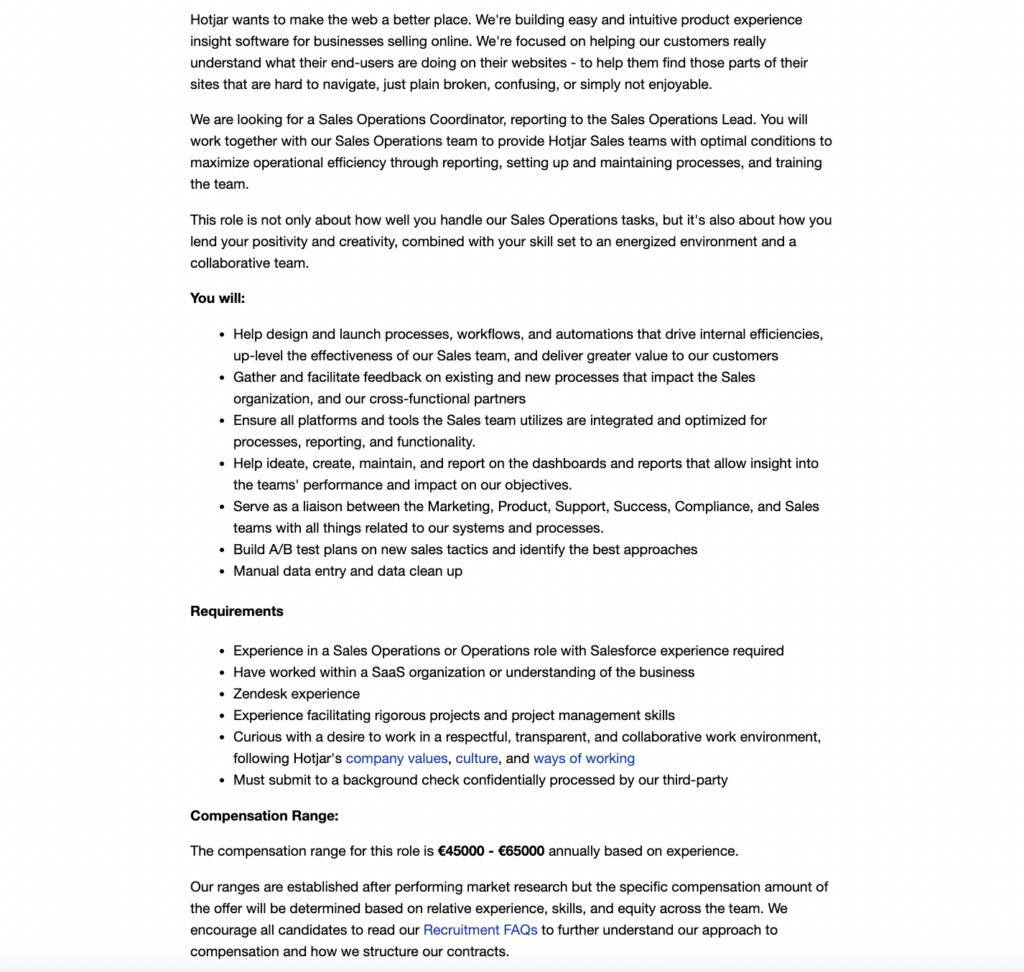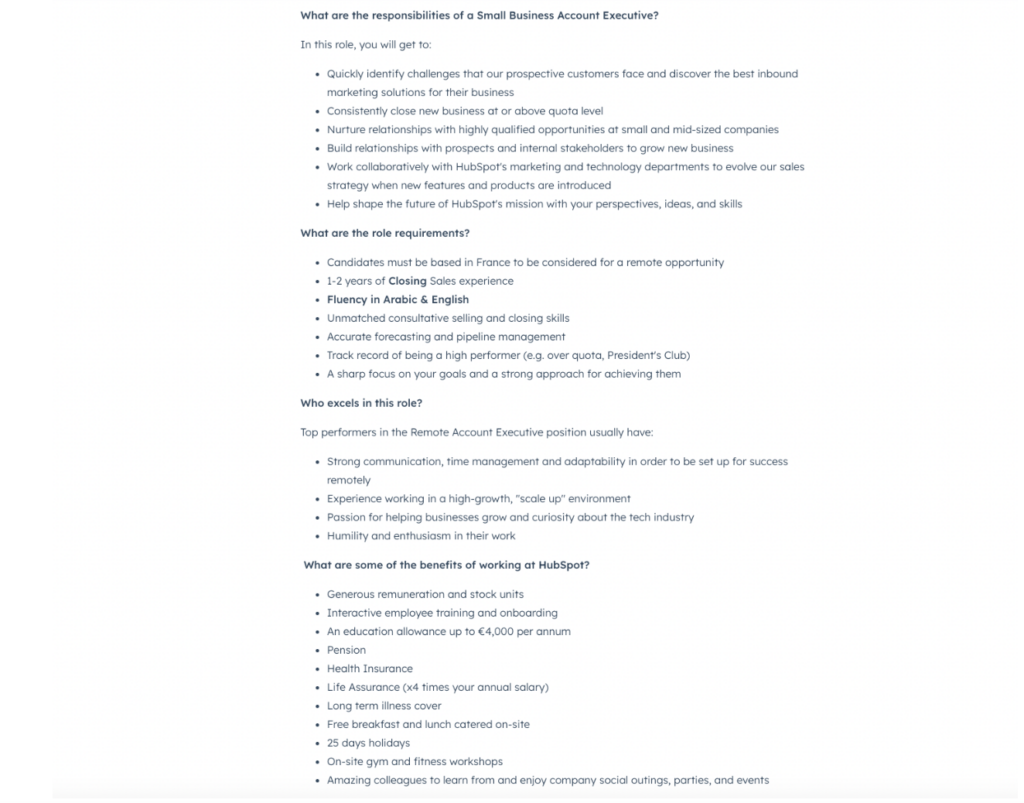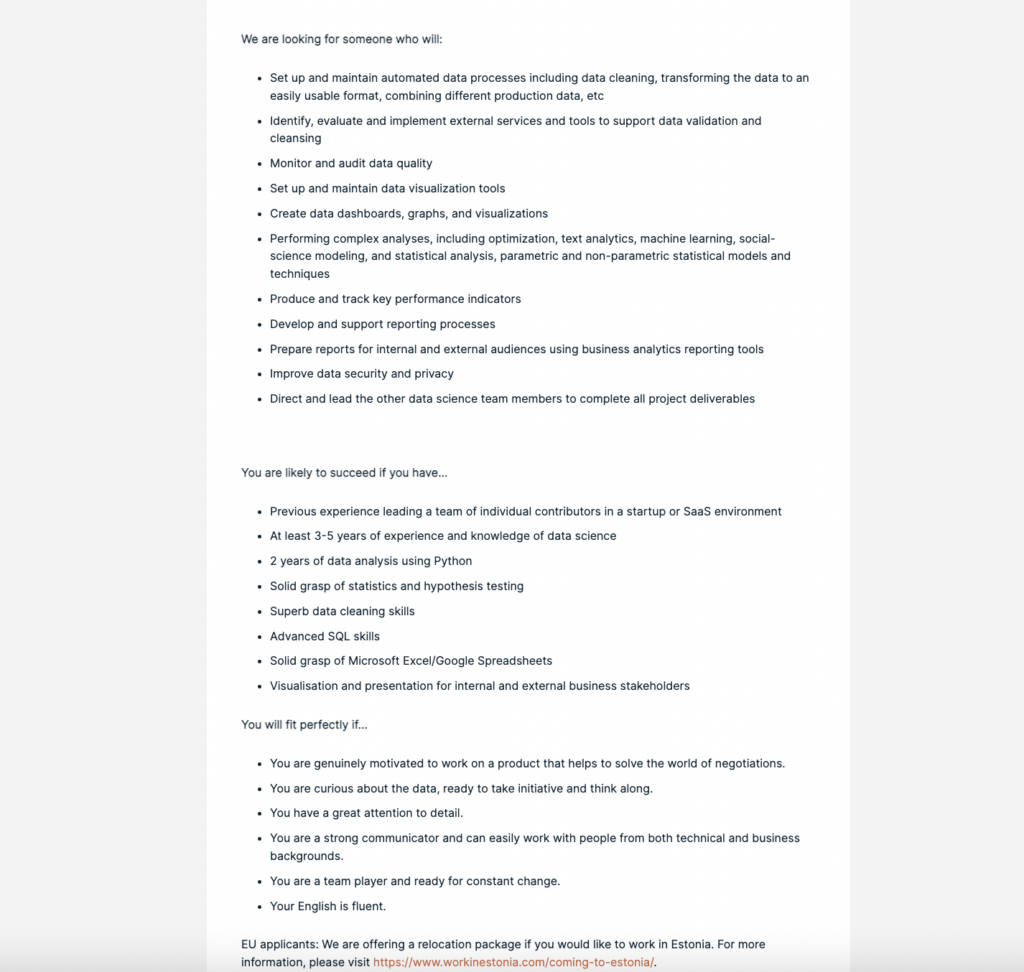What is a job description?
A job description, also known as JD in the recruitment world, is a document that describes the requirements and responsibilities for a job vacancy.
Usually, a complete job description covers the following details:
- Job title
- Job location
- Job responsibilities and duties
- Must-have and nice-to-have requirements
- Job goals
- Benefits and salary
- Company mission
- Company culture
4 reasons why creating a job description is important
You’ll be able to differentiate between quality and unsuitable candidates
Simply put, a clear JD sets the foundation for a successful recruitment process. Before you begin hunting down candidates, you must know what makes a great candidate, and what makes an unsuitable candidate.
To map out your candidate profile, you must ask yourself questions like
- What problem will the candidate start solving?
- What value will the candidate bring to the company?
- What soft skills does the candidate need?
- What hard skills does the candidate need?
- How will these skills be assessed?
- How will the candidate help the business grow?
- What kind of work experience should the candidate have?
- How should the candidate fit culturally?
- Will the person be remote or working from the office?
- What’s the budget for the role?
Answer these questions and you’ll have a better idea of who you’re looking for. Your responses will also dictate who might not be the best fit.
Once you know the required skills from the candidate, you can start mapping out the channels where to target these candidates.
It allows candidates to assess their fit
A good job description is candidate-centric, meaning it allows the candidate to assess whether the position and the company are for them or not. According to research by Indeed, 52% of job seekers say the quality of a job description is very or extremely influential on their decision to apply.
However, not all sections of the job description are created equal. LinkedIn’s research explored which parts of the job description candidates find the most useful. More than half of the candidates (61%) considered compensation to be the most useful section, followed by qualifications (49%) and daily tasks (49%).
It will help you with the interview process
Another reason why creating a job description is essential is that it will help you with the interview process. You’ll be able to decide which people have to participate in the interview process and why. Also, if you know who you’re looking for, it will be easier for you to generate interview questions. For instance, if the role requires the candidate to work autonomously and from home, then you’d want to ask them if they’d be comfortable with it in the first place.
Also, you must think critically about the most important skills needed for the role. A classic mistake is adding skills into the job description that aren’t necessary. For instance, stating that the ideal candidate must be creative, but in the actual job, it’s not an important aspect at all.
People within the team will have an understanding of the role
It can be difficult for employees from different departments to follow which roles you’re hiring for. Yet, if you have a job description ready, you can easily share it with the rest of the team. It will allow them to refer someone from their network that might be suitable for the role.
Job descriptions are also useful for the hiring team, as it allows everyone to be aligned on the expectations for the candidate. It brings clarity to who needs to be hired, and which skills need to be assessed in the process.
3 examples of great job descriptions (with notes)
Hotjar Sales Operations Coordinator

This job description by Hotjar ticks all the boxes. It gives a clear overview of the daily job tasks. Moreover, it estimates a salary range that the candidate can expect based on their experience. Based on this job description, it’s clear they have an understanding of which kind of person would excel in this role. Candidates can assess their fit with the company, based on the daily tasks, salary, company culture, and requirements.
Hubspot Account Executive

HubSpot’s job description does a great job of demonstrating the ideal candidate for the role. It outlines the requirements for the role. Also, it has a separate section for describing the type of candidate who usually excels in this role, combining personality and experience.
Furthermore, with a long list of benefits that matter, the job description answers the question of “What’s in it for me?” from the candidate’s point of view.
Pactum Data Lead

What’s great about Pactum’s job description is that it differentiates between hard skills and soft skills. Candidates have a clear overview of which hard skills are essential as a Data Lead, but also what kind of mindset/personality would fit into Pactum’s fast-paced environment.
Takeaways
Writing a job description is essential for hiring top talent. Not only will it help you in the recruitment process, but it will also allow candidates to assess their fit with your company.
In your JD, focus on the things that matter. Candidates want to know the required qualifications, and what the day-to-day in the company looks like. If possible, also share a salary range and post content to give a glimpse into your company culture.
Finally, don’t forget to share your job description internally, as you might land great referral candidates from your colleagues!


